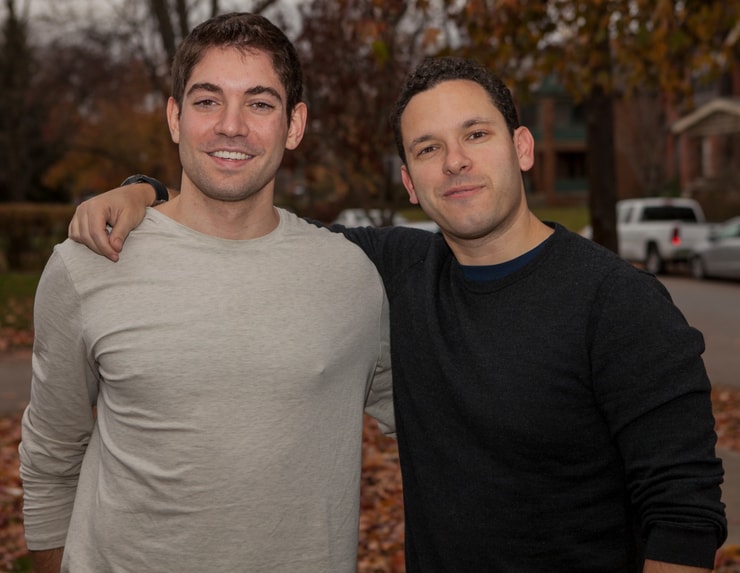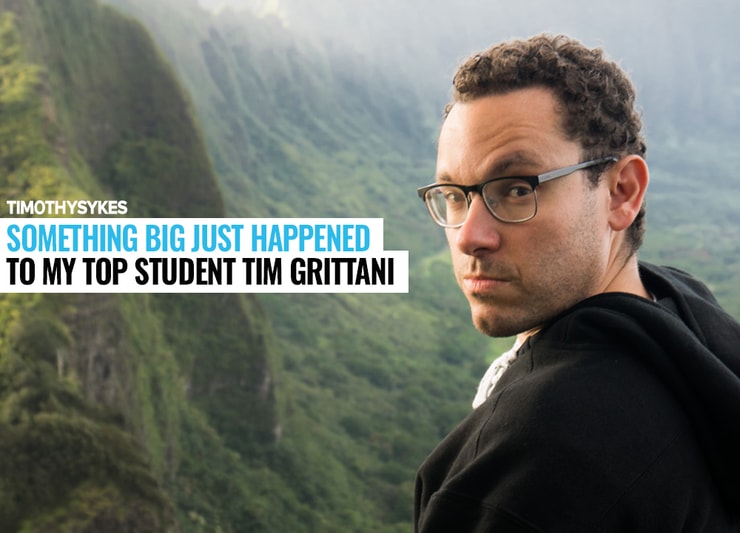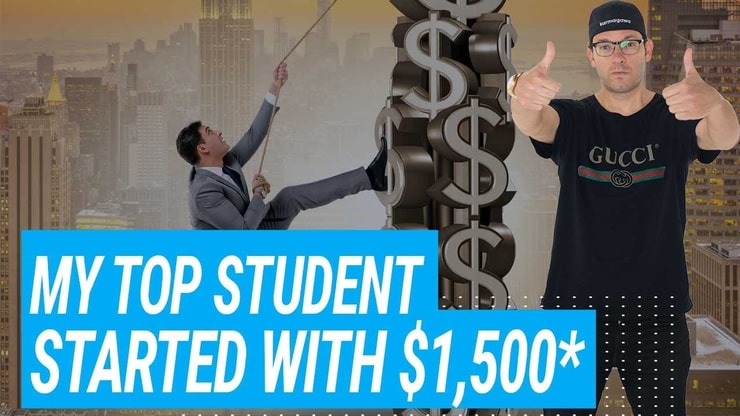Read on for an interview with Tim to celebrate his outstanding achievement. Be prepared to take notes because he’s dropped some golden nuggets you won’t want to miss.
My top student Tim Grittani just reached another huge milestone. I’m so proud of Tim I want to give him props and say congratulations. I want to scream it at the top of my lungs. Tim has worked sooooo hard over the years and generously gives back to our community.
Who knew when Tim joined the Trading Challenge back in 2012 that he’d surpass me in trading profits? I didn’t.
I can’t tell you the exact number he hit last week because it’s unverified and I don’t want to bring any FTC heat. Seriously, those guys can be scary. But they’re doing their job, which is to protect consumers — and that’s good.
It’s also why I’m so transparent and share my audited trades openly. Anyway, here’s a link if you want to have a look at Tim’s unverified profit figure.
Any numbers you read in this post have not been independently verified. And I’m not making any claims. Tim Grittani’s results are not typical. There are inherent risks involved with investing in the stock market.
Let me tell you something else — if you think this is gonna be a walk in the park then just stop reading now. Save yourself the time and energy. Go buy a get-rich-quick scheme from one of those future cellmates of Bernie.
Onward. Let’s celebrate ‘Something Big’ that recently happened for my top student Tim Grittani. Most of you know by now that Tim started trading with only $1,500** of his own money. He did manage to borrow some cash from his parents so he could open multiple accounts and overcome the PDT rule. But he was only allowed to trade with his own money.
If you don’t know the story, let me fill you in briefly. When he started, Tim Grittani studied every day for 3 months. He watched the markets. He studied for a couple hours a day outside of trading hours. He even did some paper trading. He thought he had the whole thing figured out after a string of six consecutive paper trading wins.
Then he started trading for real. And you know what he did? He tried to trade off of my alerts. Now, since Tim has enjoyed so much success (he’s killing it, but I can’t give you numbers) I think I can give him a little ribbing here. But this is also a word of warning for you, the reader.
Table of Contents
- 1 Tim Grittani In His Own Words: Deep Thoughts From a Something Big Trader
- 1.1 You’ve now hit several million-dollar milestones. Does this one feel any different?
- 1.2 What was your biggest loss? And what did you learn from it?
- 1.3 Are you just as careful about risk/reward now as you were early in your career?
- 1.4 You’re a legend when it comes to using spreadsheets to track everything. Are you still just as meticulous?
- 1.5 If you could change one thing about the way you’ve approached your career as a trader, what would it be?
- 1.6 I often tell the story about you not making money your first 9 months. You’ve said you spent 3 months of study and 6 months of trading before you really got it. How much time did you put into study? Do you still study?
- 1.7 When you plan a trade, do you go through my PREPARE checklist? Or do you have something of your own?
- 1.8 Back when you’d made something like $2.7 million you said you felt if you didn’t make $20K per week it was a bad week. What are your expectations now?
- 1.9 You borrowed $12K from your parents to set up different accounts to overcome the PDT rule. Did you pay them back? Have you treated them to anything — like a new house or a vacation?
- 1.10 Do you drive a supercar? (inquiring minds want to know … )
- 1.11 What’s the biggest thing you’ve splashed out on with your earnings?
- 1.12 Obviously, you’re a great trader. Do you have hobbies or interests outside of trading?
- 1.13 I teach cutting losses quickly. You believe in cutting losses intelligently. What’s the difference between cutting losses intelligently and cutting losses quickly?
- 1.14 Do milestones such as ‘Something Big’ matter? If not so far … will joining the ‘Something Even Bigger With An Extra Digit’ club in a couple of years matter? Or is it really just a way to keep track?
- 1.15 What was your best trade since your last big milestone?
- 1.16 What about the worst trade? Is there a lesson you can share from that trade?
- 1.17 Do you have any words of inspiration for newbies? What about those who’ve been at it a while but haven’t yet had much success?
- 2 The Teacher Becomes the Student: What I’ve Learned From Tim Grittani
Don’t Trade From Alerts
I put alerts up over on Profitly so you can learn from my trades. I want you to follow along, see what I was thinking, and understand what did or didn’t work. NEVER trade from my alerts. That’s called chasing a trade. It’s also how Tim Grittani blew up his initial $1,500 account. He had to get a summer job to re-fund his account.
Then he started tracking everything. He figured out what was working for him. As it turns out, it was only two patterns. He’d tried short selling and he was terrible at it. (Back then, that is. Now, he’s brilliant at shorting.) So he found his two patterns and started winning.
Do you know what he figured out? He didn’t want to become a millionaire as fast as possible. He wasn’t trying to hit a home run every day. Tim Grittani decided he wanted to become self-sufficient. He wanted to be able to make a decent living trading.

That’s it.
And he got to work. He focused. He kept spreadsheets of everything. He watched the DVDs and read books. In other words, he put in the hard graft. No screwing around.
Which is a good thing, because he’d moved back home after graduating college to trade full-time. His parents told him he had to make a certain amount (a Smaller Something Big) by a certain date or he’d have to stop trading.
Talk about an ultimatum to get you focused! He had like 3 months or something. What did he do? He made the money he had to make. Not only did his parents not kick him out of the house, they gladly accepted as he paid back the money he’d borrowed. It took about a year but he paid back every penny.
Which doesn’t exactly bring us up to the present. Tim’s passed quite a few milestones before this one. You can read about one of them here. Since a post like that would be seriously long this time around, I opted for a different approach.
I sent Tim an email with some questions. We’re on opposite sides of the world right now, so email was most convenient. I asked him about his recent ‘Something Big’ and about his career as a trader.
I even asked some questions I rarely ask, like “Do you drive a Lambo?” Not surprisingly, the answer was no. But that’s because Tim Grittani is totally down to earth and has no need to drive around in a supercar.
Let’s do this …
… to celebrate Tim Grittani’s latest ‘Something Big’ …
… I give you …
Tim Grittani In His Own Words: Deep Thoughts From a Something Big Trader

Obviously, the questions are mine. The answers are Tim Grittani’s. Before we get into the meat of the interview, I want to thank Tim for being so gracious to answer these questions. So, thank you, Tim.
I’ve interviewed Tim before and even asked some of the same questions. He’s always willing to answer and I appreciate it. (Show him some love at the end of this post).
I reserve the right to interject deep thoughts of my own about Tim Grittani’s deep thoughts. I’ll make sure you know which Tim is talking. Or writing.
Here we go …
You’ve now hit several million-dollar milestones. Does this one feel any different?
They definitely all feel good, but I can’t say that they’ve felt any different or better each time. I’m very grateful for each milestone and certainly take nothing for granted, but I don’t get too big of a high from them.
The way I see it, account growth and milestones are almost to be expected as long as I do my job and stay disciplined each day. Also, whether you have $4 million or $8 million, you aren’t going to be a happier person. More money is great, but that’s really not what’s meaningful or matters in life.
[Tim Sykes here. When I interject I’ll put my words in these brackets. Okay, first thing: Tim Grittani’s results are not typical. And those numbers he’s throwing around up there — those are crazy numbers. It’s highly unlikely you’re gonna be able to do that. To be safe, let’s say it’s not gonna happen.] [One more thing. Notice how Tim said more money isn’t going to make you a happier person? I agree completely.]More Breaking News
- Credo Technology Unveils AI Retimer Amid Strategic Partnerships
- Spotify’s Financial Surge: Poised for Growth Amid Upgrades and Strategic Moves
- AZI Stock Slips as Investors Eye Key Developments
- GTM Stock Experiences Notable Fluctuations Amid Recent Financial Developments
What was your biggest loss? And what did you learn from it?
My largest loss was $290,000 on a very early $LAKE short in October 2014. At the time, I think my main takeaway was to not get stubborn and that cutting losses is a MUST. But after more large losses and time to reflect, I found that my biggest lesson was how to handle situations when I do break rules and get stubborn.
The most important rule I established for myself was that I would NEVER add to a losing position if it was outside of my plan. Ever since I made that adjustment, my trading has been so much more controlled and consistent.
[Tim Sykes here again. Any emphasis, whether bold or italic, is mine. I’ll do that in some of Grittani’s answers. You should commit pretty much every word he wrote to memory. You could put the bold words on note cards. Then place them next to your computer so you never forget them in the heat of a trade.]Are you just as careful about risk/reward now as you were early in your career?
Early in my career cutting losses was my #1 focus by far, the last thing I wanted was to lose my account on one big blowup. I’m probably back to that level of loss cutting now, where I know my risk level every trade and if it hits, I am out!
There were definitely a few years in the middle though where I got cocky and really let things run against me, those terrible habits were so hard to break, and resulted in numerous monster losses.
[Tim is incredibly introspective, as you’ll find out in his answers to my questions. He overcame bad habits by identifying and tracking them. That’s serious dedication.]You’re a legend when it comes to using spreadsheets to track everything. Are you still just as meticulous?
There was a period of a couple years where I didn’t track much once I felt like I knew what I was doing. But recently I’ve studied coding a bit and learned to automate some of my tracking, which has allowed me to get back into it with minimal effort.
I’m back to building spreadsheets and looking for multiple new edges to exploit, and going in depth at a level I really haven’t before. It’s pretty exciting as I’ve already seen some interesting results.
[Never. Stop. Learning. Tim Grittani is just so impressive when it comes to this. Coding. He’s coding now? Watch out. I predict many more ‘Something Big’ moments in his future.]If you could change one thing about the way you’ve approached your career as a trader, what would it be?
This is a very tough question! It’s hard to want to change much given the way things have turned out.
The main thing that springs to mind is that I wish I could find a way to have a little bit more of a work/life balance, where I’m not so afraid to walk away from the screen during the day or detach from the market during a vacation.
Maybe part of my success is due to my obsessive nature, but sometimes I do feel like I’m wasting time in front of the screen when I don’t have to, especially on slow days.
[If you’ve not watched Tim’s videos on YouTube, you should definitely check them out. He talks a lot about the psychology of trading. One of the big problems he mentioned recently is boredom trades. He likens it to trading a C or D list setup when there’s no A or B list trade — just to get some action. Overtrading sucks. Period. Don’t do it.]I often tell the story about you not making money your first 9 months. You’ve said you spent 3 months of study and 6 months of trading before you really got it. How much time did you put into study? Do you still study?
Back when I was getting started, between video lessons and DVDs, as well as a little of my own tracking, I would say at least two hours a day outside of market hours studying. If you consider the spreadsheet work I still do studying, then I do still study! But as far as webinars or video lessons, I can’t tell you the last time I’ve watched one.
[Tim Grittani is still putting in the hard graft. After more than 7 years and several ‘Something Big’ levels reached! Did you catch that he’s now learning to code? Are you starting to understand why Tim gets to celebrate new levels of success on a regular basis?]When you plan a trade, do you go through my PREPARE checklist? Or do you have something of your own?
I think you came out with that checklist after I had already become self-sufficient, so I’m not really sure what the details of it are! I’ve really developed my own process at this point.
- I find a stock on my scanner
- check its daily chart
- check its share count
- then dive deeper into filings looking for anything dilutive if I’m still interested at that point.
Back when you’d made something like $2.7 million you said you felt if you didn’t make $20K per week it was a bad week. What are your expectations now?
I really try my best not to set profit goals of any kind anymore, experience has taught me that market conditions can fluctuate so much and some weeks can have absolutely no solid opportunity.
If I go into any week or month with a profit goal, it’s inevitable that I’ll start pushing trying to make it a reality, which usually leads to dumb losses. My goal each week now really is just to feel like I traded the setups the market gave me as well as possible; if I do that, the money will take care of itself.
[Are you paying attention? This is huge. Tim isn’t chasing a dollar number. Nor is he forcing trades. At least most of the time, as he’ll admit. He wants to trade the setups the right way. Does this mean Tim always wins? Absolutely not. But he tries to avoid making mistakes. Mistakes lead to bigger losses.]You borrowed $12K from your parents to set up different accounts to overcome the PDT rule. Did you pay them back? Have you treated them to anything — like a new house or a vacation?
I paid them back in pieces in 2012 as I was starting to really grow my account. I also paid them back for a portion of my college tuition since they had been generous enough to pay for that in the first place. Aside from that, I’ve just tried to get a bit more generous with my Christmas and birthday gifts — haha.
Do you drive a supercar? (inquiring minds want to know … )
I’m sorry to say no supercar for me! Unless a Mini Cooper counts. I got one for my wife when we lived in Colorado and would drive it from time to time. To be honest, I didn’t fit in it very well. Eventually I’m going to buy a Tesla or two, but I really don’t need anything too flashy!
[Material things don’t make you happy. I have my cars to get people’s attention and inspire them. To be honest, it’s scary as hell driving a Lambo.]
What’s the biggest thing you’ve splashed out on with your earnings?
I’ve always had a very difficult time spending money on myself. So far my largest purchase has been an oceanfront condo when we moved to Puerto Rico. Other than that, I like to treat myself to first class sets when I fly usually.
[Nice. I want you to dream of a better lifestyle. Tim Grittani is very humble and down to earth, but who doesn’t want to travel first class?]Obviously, you’re a great trader. Do you have hobbies or interests outside of trading?
I’ve recently started getting back into bowling. I used to be a pretty good bowler and it really bothers me I’m not good at it anymore! I also enjoy playing a video game from my childhood, Starcraft.
I’d like to say I’m competitive but they definitely have my number in that. Any other free time I try to spend learning new things, like coding, which I’ve been able to apply in some cool ways towards spreadsheet tracking for both trading and unrelated projects.
[Tim Grittani’s success is no mystery. He’s an eternal student. I hope you’re taking notes. I am. Yes, he still has play time, but he’s learning a new skill that dovetails with his prodigious trading skills.]I teach cutting losses quickly. You believe in cutting losses intelligently. What’s the difference between cutting losses intelligently and cutting losses quickly?
Cutting losses quickly I’ve always felt like is seeing that you’re down in a trade and saying, “Oh no, I better get out!” I don’t like that approach. I think all decisions should be made based off of that chart and what it is telling you. So for me, cutting losses intelligently means getting out as fast as possible if a key support level breaks down, for example. I’m not just getting randomly scared out that way.
Do milestones such as ‘Something Big’ matter? If not so far … will joining the ‘Something Even Bigger With An Extra Digit’ club in a couple of years matter? Or is it really just a way to keep track?
It’s really just a way to keep track. The money itself doesn’t become more significant the more I make. I think the main significance I take away from it is that each milestone proves any haters/trolls further wrong.
When I hit $1 million and CNN wrote the piece on me, I definitely noticed a lot of people thinking I got lucky or just hit a couple big trades. I definitely used that as motivation, and know that every week/month/year of further success just further solidifies that trading is predictable and luck has VERY LITTLE to do with it.
[Predictable doesn’t mean easy. Tim Grittani is a great believer in self-study. He tracks everything. I remember him giving a speech where he was contrarian toward my First Green Day pattern. He’d tracked a bunch of First Green Days and decided it wasn’t a high enough percentage play for him. Also, every trader is different and market conditions change. That’s why you have to study.]What was your best trade since your last big milestone?

One of the best that immediately comes to mind has to be my SHMP long on the perfect multi-day breakout in February past the $0.30 area. I made $61,000 on that long, about a 40% gain on my position. Although the OTC market can definitely be slow at times, it’s still there, and every time it heats up I’m ready to take advantage just like this!
[Preparation is key to success. Tim doesn’t only trade OTC stocks these days. But when something gets hot, he’s ready.]I was trying to trade while flying on an airplane this January, and definitely had a bit to drink. I saw a low float play close to breaking out, and since my first week had been slow I decided I wanted to buy it huge and nail a big trade, despite the setup not being perfect yet.
To make this even dumber, I knew that there was active dilution but hoped that it could overcome it. The setup of course failed, and although I stopped out where I was supposed to, I still ate a loss of over $30,000. A great example of forcing a trade leading to terrible results!
[Read that one again. Every trader, at some point in their career, tries to force trades. Even someone as experienced as Tim Grittani can still fall prey to swinging for the fences. Even the best of us have to keep learning some lessons the hard way. The good thing is that Tim stopped out where he was supposed to. He didn’t make it worse by being stubborn.]Do you have any words of inspiration for newbies? What about those who’ve been at it a while but haven’t yet had much success?
I think the most important message I can convey is that I got to where I am by being VERY self-critical. You have to be honest with yourself. You have to see what’s working and what isn’t. You have to be independent and not trying to blindly follow alerts.
I, alone, am the one pressing the buttons — any loss is MY fault! If it’s a good setup that failed, so be it. But many times it’s an avoidable mistake. Take responsibility, recognize where you succeed or fail, and ADAPT.
Trading success is possible without being perfect, I still make mistakes all the time. You just have to be willing to recognize those mistakes and never stop working to get better and find new edges. If you don’t have that kind of hunger or passion for trading, then save your money and find something else to chase that inspires you!
[End of interview. Once again, thank you Tim Grittani for sharing.]The Teacher Becomes the Student: What I’ve Learned From Tim Grittani
I can’t say enough good things about Tim Grittani. Not only is he my top student, he’s one of the most down-to-earth people I know. He shares great information with Trading Challenge students by doing a monthly webinar. Apply for the Trading Challenge here.
One of the best things about having a student like Tim Grittani is that I can continue to learn as well. Every time we do an interview I pick up something new. At the very least I get some powerful reminders.
My Takeaways From Tim Grittani’s Interview Answers
- Take responsibility for yourself and your trading.
- Adapt to changing market conditions.
- Don’t force trades.
- Cut losses quickly. (OK, Tim says ‘intelligently’ and he’s right, but until you gain more experience be super safe.)
- Never stop learning.
- Find a work/life balance.
- Don’t set dollar amount profit goals. Work on trading the setups without making mistakes.
- Know your risk level and when you’ve hit it, get out.
Tim’s DVD over on Profitly — Trading Tickers — is one of the top sellers. Get it. He has something like 35 live trades on the DVD so you get to see exactly how he trades.
I hope you’ll join me in congratulating my top student Tim Grittani on his massive achievement by commenting below. Go on, give him some love! Then share this post.





Leave a reply